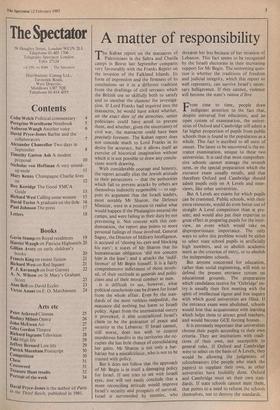A matter of responsibility
The Kahan report on the massacres of Palestinians in the Sabra and Chatila camps in Beirut last September compares very favourably with the Franks Report on the invasion of the Falkland Islands. Its form of expression and the firmness of its conclusions set it in a different tradition from the draftings of civil servants which the British use so skilfully both to satisfy and to smother the clamour for investiga- tion. If Lord Franks had inquired into the massacres, he would have asked whether, on the exact date of the atrocities, senior politicians could have acted to prevent them, and whether, given the uncertainty of civil war, the massacres could have been precisely foreseen. The Kahan report does not concede much to Lord Franks in its desire for accuracy, but it allows itself an exercise of historical imagination without which it is not possible to draw any conclu- sions worth drawing.
With considerable courage and honesty, the report actually cites the Jewish attitude to their persecutors — that the authorities which fail to prevent attacks by others are themselves indirectly responsible — to sup- port its argument that the Israeli leaders, most notably Mr Sharon, the Defence Minister, were in a position to realise what would happen if the Phalangists entered the camps, and were failing in their duty by not preventing it. Not content with this con- demnation, the report also points to more personal failings of those involved. General Saguy, the Director of Military Intelligence, is accused of `closing his eyes and blocking his ears'; it states of Mr Sharon that his humanitarian obligation 'did not concern him in the least'; and it attacks the `indif- ference' of Mr Begin himself. It is a fairly comprehensive indictment of those involv- ed, of their rectitude as generals and politi- cians and of their moral conduct as men.
It is difficult to see, however, what political conclusions can be drawn for Israel from the whole affair. Even by the stan- dards of the most ruthless realpolilik, the massacre did nothing but harm to Israeli policy. Apart from the international outcry it provoked, it also contradicted Israel's claim to be the guarantor of peace and security in the Lebanon. If Israel cannot, still worse, does not wish to control murderous bandits in the territories she oc- cupies she has little chance of consolidating her gains. Mr Sharon is not only a bar- barian but a miscalculator, who is not to be trusted with policy. But it does not follow that the approach of Mr Begin is in itself a damaging policy for Israel. If one tries to see with Israeli eyes, one will not easily conclude that a more reconciling attitude would improve Israel's security and prospects of survival. Israel is surrounded by enemies, who threaten her less because of her invasion of Lebanon. This fact seems to be recognised by the Israeli electorate in their increasing support for Mr Begin. The interesting ques- tion is whether the traditions of freedom and judicial integrity, which this report so well represents, can survive Israel's neces- sary belligerence. If they cannot, violence will become the state's raison d'être.
Vrom time to time, people draw indignant attention to the fact that, despite universal free education, and an open system of examination, the univer- sities of Oxford and Cambridge still admit a far higher proportion of pupils from public schools than is found in the population as a whole. This fact is ascribed to all sorts of causes. The latest to be uncovered is the en- trance examination, unique to these two universities. It is said that most comprehen- sive schools cannot manage the seventh term, or the special preparation which the entrance exam usually entails, and that therefore Oxford and Cambridge should admit pupils only on A Levels and inter- views, like other universities.
But A Levels are exams for which pupils can be crammed. Public schools, with their extra resources, would do even better out of straight A Level competition than at pre- sent; and would also put their expertise to great effect in preparing pupils for the inter- view, an event which would take on disproportionate importance. The only ways to solve this problem would be either to select state school pupils in artificially high numbers, and so abolish academic merit as the criterion of entry, or to abolish the independent schools.
But anyone concerned for education, rather than social engineering, will wish to defend the present entrance system on educational grounds. The preparation which candidates receive for 'Oxbridge' en- try is usually their first meeting with the spirit of intellectual rigour and free inquiry with which good universities are filled. If the entrance exam were abolished, schools would lose that acquaintance with learning which helps them to attract good teachers, and would become GCE forcing houses.
It is extremely important that universities choose their pupils according to their own criteria. They are institutions with tradi- tions of their own, not susceptible to general rules. If Oxford and Cambridge were to select on the basis of A Levels, they would be allowing the judgments of schoolmasters (the people who mark the! papers) to supplant their own, as other universities have foolishly done. Oxford and Cambridge must set their own stan- dards. If state schools cannot meet them, that points to a need to reform the schools themselves, not to destroy the standards.






































 Previous page
Previous page